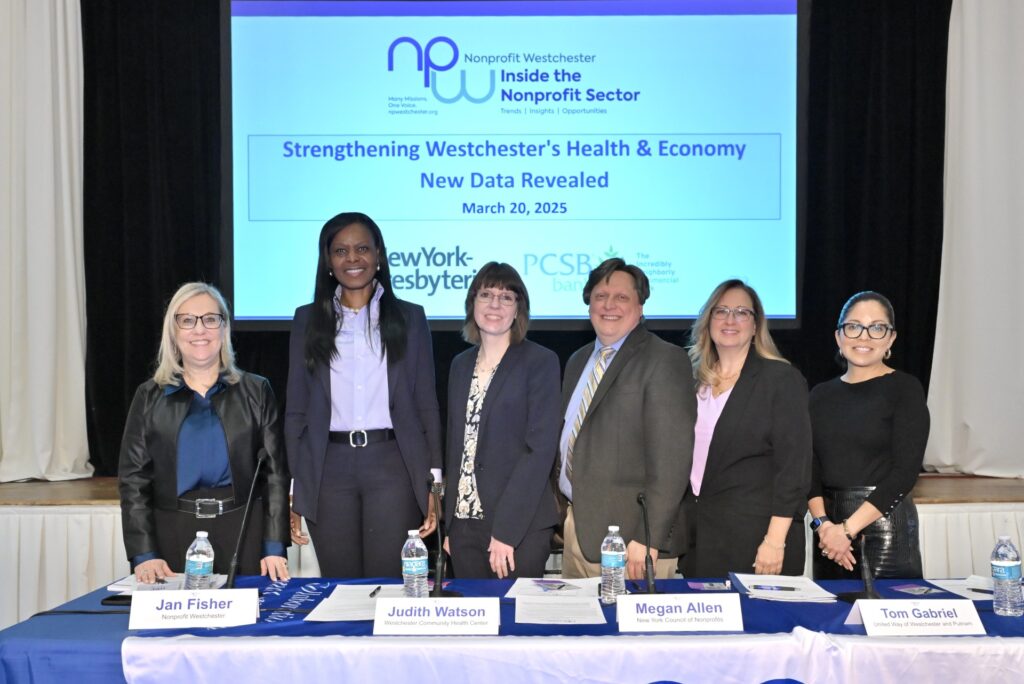
During a time of uncertainty about federal funding for safety net programs, more than 200 nonprofit, healthcare, government and business leaders from across Westchester met to underscore the importance of nonprofits, not only to the people they serve but to the health of the entire region.
Speaking at a special program, Strengthening Westchester’s Health and Economy: New Data Revealed, experts shared recent data on how nonprofits help to drive Westchester’s economy, improve health outcomes, and reduce healthcare and other social services costs through programs that keep residents healthy and safe. Nonprofits provide services including mental health, early childhood education, shelter and services for the homeless, recovery aid from storms and other weather events, public safety, and arts and cultural programs and so much more.
“The health of the nonprofit sector is critical to the social and economic health of Westchester County,’’ said Nonprofit Westchester Executive Director Jan Fisher during the program at C.V. Rich Mansion in White Plains. “Yet this impact is not fully understood or capitalized on. Today we are here to increase that understanding as well as opportunities to strengthen our community.’’
Fisher said for nonprofits to remain strong and sustainable the state needs to reform an inefficient contracting system where payments are chronically late and provide more competitive salaries to nonprofit workers to attract and keep quality talent. She also issued a call to action to the business sector, urging them to collaborate with nonprofits on advocacy efforts, including pressing for these essential contracting reforms. Fisher emphasized that strengthening the nonprofit sector is not just a nonprofit issue—it is a business and economic issue that affects the entire community.
Megan Allen, CEO, New York Council of Nonprofits, said that as of December of 2024, there were over 119,000 nonprofits in New York operating in nearly every industry, which account for over 1.3 million jobs. Nonprofits employ more New York State residents than the construction and insurance industries combined, accounting for 16.8 percent of the total workforce. In Westchester, that number is about 56,000 people or 16.2 percent of the workforce, she said.
Tom Gabriel, President and CEO of the United Way of Westchester and Putnam, said according to the latest ALICE® (Asset Limited, Income Constrained, Employed) Report released by United Way of New York State, more than a third of Hudson Valley households were living paycheck to paycheck. From 2019 to 2025 the cost of groceries for a single parent, one-child family rose from $600 a month to $1,500. He said inflation had risen another 3 percent since January.
“This is the real world in which nonprofits are responding. They are not getting free money. They are responding to hunger, homelessness, and real needs in our community,’’ he said.
Gabriel added that recent proposed federal cuts triggered by the President’s executive orders would not only devastate vulnerable populations who receive assistance, but result in a loss of jobs that would strike a blow to the economy given that nonprofits account for nearly 17 percent of jobs in New York State.
“When you are cutting food stamps, SNAP benefits etc. there are people who administer those programs, those are jobs,’’ he said. He added, “There is so much uncertainty around some of these executive orders and in some cases, the rule of law is not being followed, they are just being implemented.’’
Gabriel said executive orders have targeted basic services such as $1 billion to help schools and food banks purchase food, proposed cuts that would make 12 million children ineligible for school meals. In addition, more than 42 million Americans would be affected by cuts to SNAP or food stamps as well as cuts to the Federal Emergency Management Agency (FEMA) that would cause Westchester to lose $500,000 from its Emergency Food and Shelter program.
Judith Watson, CEO of the Westchester Community Health Center, emphasized that nonprofits have a large role in supporting the health and well-being of a community. She highlighted that essential services such as economic stability, education, housing, food, and childcare — among other supports provided by nonprofits — are key social determinants of health that directly impact health outcomes. “It impacts the health of each and every one of us. We can’t do this work alone. We have to do it together,’’ she said.
Monica Hidalgo, Corporate Director of Community Relations for NewYork Presbyterian, and Taryn Duffy, Founder and President of Tarsam Public Affairs, both discussed how businesses and hospitals work with nonprofits to keep the community healthier and advance other people-focused goals.
Hidalgo said that NewYork Presbyterian, like other hospitals, uses data such as community health needs assessments to determine how they can best support a community’s health needs. She said NewYork Presbyterian invested nearly $1 million in Westchester this past year to support programs to combat food insecurity and support maternal child health.
Duffy, who worked for MGM and Empire City in public affairs and community outreach for many years, said that data shows that corporations benefit from philanthropy, enjoying broader support from consumers and employees when they do good work. She encouraged other companies to do the same.
“The benefits of corporate social responsibility touches every area of the business, everything from investor relations and brand reputation to customer loyalty and workforce engagement. 77 percent of consumers are motivated to purchase from companies that are committed to making the world a better place. 71 percent of employees actually care whether or not their employers are giving back through philanthropy and volunteering.’’
She said nearly 99 percent of S&P 500 companies filed corporate social responsibility reports in 2023 compared with only 20 percent in 2011.
Michael Schiliro, Senior Vice President, PCSB Bank, said it was not only the business community’s responsibility to help support nonprofits, but it makes good financial sense. “We need to pay attention to how we can better improve society. At PCSB Bank we are proud of being engaged in the nonprofit community for over 150 years.’’
Westchester County Executive Ken Jenkins delivered the opening remarks for the program. Also speaking were: Paul J. Dunphey, Senior Vice President & Chief Operating Officer, NYP Westchester Hospital and Ron Abad, NPW President; CEO, Community Housing Innovations.
Key event photos can be viewed here, and the full photo album is available here. Additionally, the referenced reports, data, and presentation slides can be accessed here.
About Nonprofit Westchester To learn more about Nonprofit Westchester, visit their website at www.npwestchester.org.





